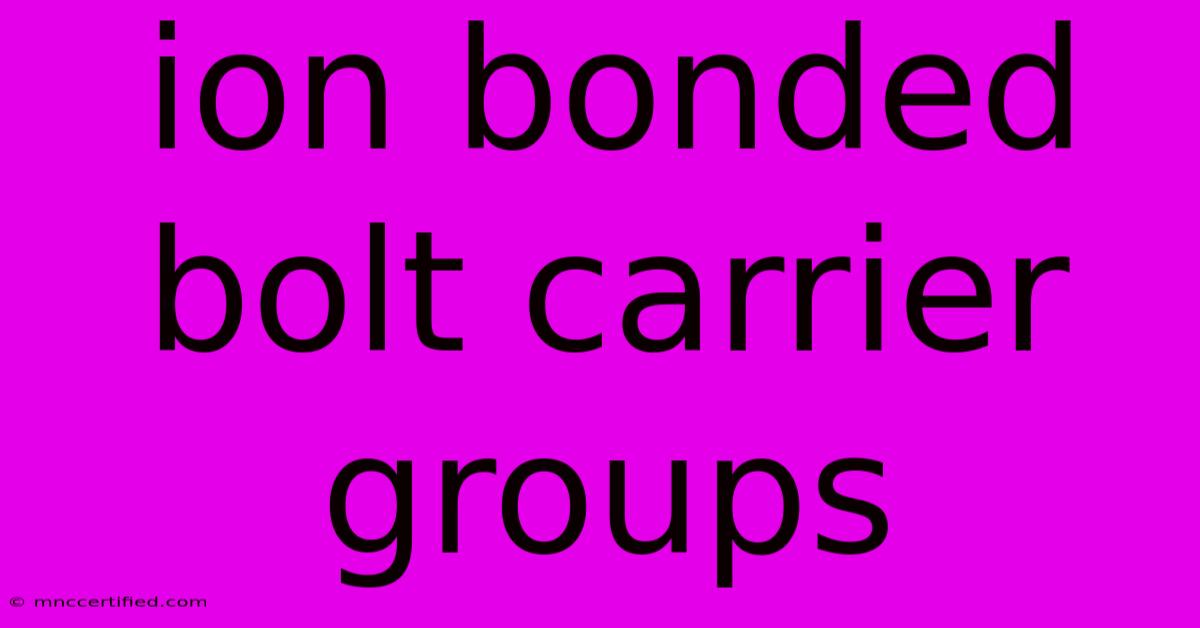Ion Bonded Bolt Carrier Groups

Table of Contents
Ion Bonded Bolt Carrier Groups: Superior Strength and Reliability
Bolt carrier groups (BCGs) are the heart of any AR-15 or similar semi-automatic firearm. They endure immense stress and pressure during firing, making their durability paramount. While standard BCGs utilize various manufacturing processes, ion bonded bolt carrier groups represent a significant advancement in terms of longevity and performance. This article delves into the specifics of ion bonding, its advantages, and why you should consider this superior technology for your firearm.
What is Ion Bonding?
Ion bonding, also known as ion implantation, is an advanced surface treatment process that dramatically enhances the properties of a metal. Unlike traditional coatings, ion bonding alters the metal's crystalline structure at a molecular level. This involves bombarding the surface with high-energy ions of a chosen element (often nitrogen or titanium). These ions penetrate the surface, creating a diffusion layer that significantly increases hardness, wear resistance, and corrosion resistance.
How it Improves Bolt Carrier Groups
For BCGs, this translates to several key advantages:
-
Increased Hardness: Ion bonding significantly increases the hardness of the bolt carrier group's surface, making it far more resistant to wear and tear. This is crucial in high-round-count scenarios, ensuring the BCG continues to function reliably even after extensive use.
-
Enhanced Durability: The enhanced hardness directly contributes to increased durability. The BCG is less susceptible to damage from friction, impacts, and the harsh conditions of firing. This translates to a longer lifespan and reduced maintenance.
-
Superior Corrosion Resistance: Ion bonding creates a surface layer that's highly resistant to corrosion. This is especially beneficial in environments with high humidity or exposure to harsh elements, preventing rust and maintaining optimal performance.
-
Reduced Friction: The modified surface reduces friction between moving parts, leading to smoother operation and potentially increased accuracy. This can be a subtle but noticeable improvement for the discerning shooter.
Ion Bonded BCG vs. Standard BCG: A Comparison
While standard BCGs are adequate for casual shooting, ion bonded bolt carrier groups offer a significant upgrade for those who demand superior reliability and longevity. Here's a direct comparison:
| Feature | Ion Bonded BCG | Standard BCG |
|---|---|---|
| Hardness | Significantly Higher | Lower |
| Durability | Significantly Higher | Lower |
| Corrosion Resistance | Significantly Higher | Lower |
| Lifespan | Significantly Longer | Shorter |
| Cost | Generally Higher | Lower |
Choosing the Right Ion Bonded BCG
When selecting an ion bonded BCG, consider these factors:
- Material: Most are made from high-quality materials like Carpenter 158 steel, known for its strength and toughness. Ensure you choose a reputable manufacturer.
- Manufacturer: Research different manufacturers and read reviews. Choose a reputable company with a proven track record of producing high-quality BCGs.
- Finish: While many are nitride treated for additional corrosion resistance, the ion bonding process itself already offers exceptional protection.
Conclusion: Investing in Longevity
While the initial cost of an ion bonded bolt carrier group might be slightly higher, the long-term benefits far outweigh the expense. The increased durability, longevity, and reliability make it a worthwhile investment for serious shooters, competitive shooters, and anyone who values the dependability of their firearm. The superior performance and reduced maintenance justify the slightly elevated price, making them a premium choice for discerning firearm owners. This enhanced performance translates to peace of mind, knowing your firearm's core component is built to endure even the most demanding conditions.

Thank you for visiting our website wich cover about Ion Bonded Bolt Carrier Groups. We hope the information provided has been useful to you. Feel free to contact us if you have any questions or need further assistance. See you next time and dont miss to bookmark.
Featured Posts
-
Fortnite Juice Wrld Skin How To Unlock
Nov 26, 2024
-
Dan Hurley Spots U Conn Basketball Talent
Nov 26, 2024
-
Trending Crypto Hashtags Today
Nov 26, 2024
-
Lana Del Rey Hampden Park Gig Next Year
Nov 26, 2024
-
How Expensive Is Tooth Bonding
Nov 26, 2024